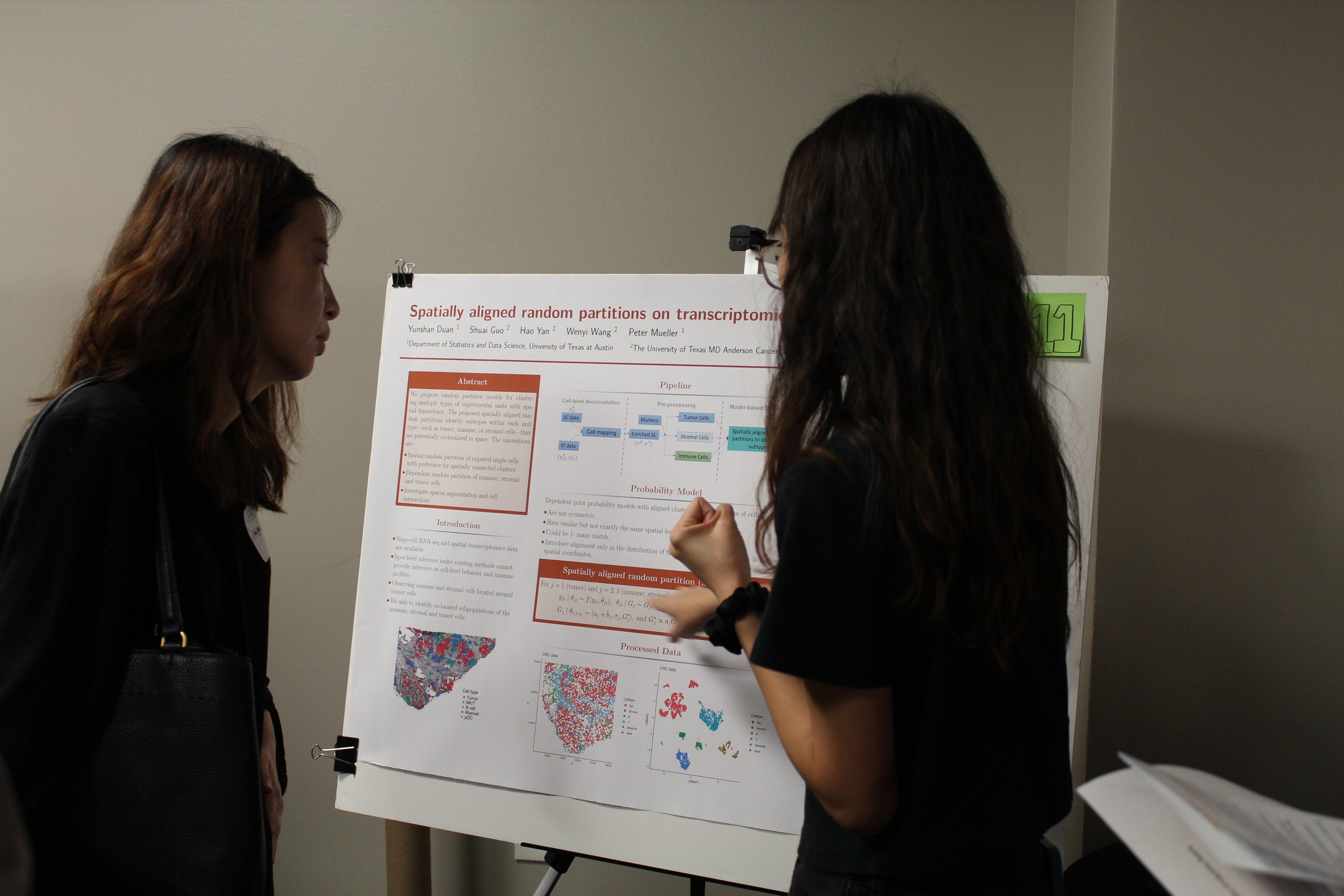Discoveries in our department, based on inferences and decisions from the data all around us, deliver research advances with a real-world impact in health care, finance, public life, technology and science.
Research Strengths
- Algorithmic Fairness
- Bayesian Statistics
- Causal Inference
- Longitudinal Analysis
- Monte Carlo and MCMC Methods
- Network Analysis
- Nonparametric Methods
- Spatial and Spatio-Temporal Statistics
- Statistical/Machine Learning
- Time-Series Analysis
Centers, Institutes and Initiatives
Statistics and Data Sciences researchers participate in interdisciplinary efforts across campus to advance insights in areas such as machine learning, epidemiology and population research.
- Center for Health & Environment: Education and Research (CHEER) is a hub for multidisciplinary environmental health sciences research and education, bringing together experts from across UT Austin.
- Good Systems is working to establish a framework for evaluating, developing, implementing and regulating AI-based technologies so they reflect human values. It is a UT Austin Grand Challenge and part of its Bridging Barriers initiative.
- Hobby-Eberly Telescope Dark Energy Experiment (HETDEX) represents a major UT Austin-led research initiative with TACC, the McDonald Observatory and faculty experts from across astronomy, physics, statistics and data sciences and more.
- Machine Learning Laboratory includes computer scientists, engineers, data scientists, statisticians and mathematicians from across campus and serves as the academic home for the NSF-funded Institute for Foundations of Machine Learning.
- NSF-Simons AI Institute for Cosmic Origins (CosmicAI) works on accessible, trustworthy and accelerated AI for astronomy
- OriGen Health Research Center is a partnership that brings together experts in genetics, obesity, human development, statistics, AI and machine learning to uncover the biological and social drivers of chronic disease, using the largest biobank in Latin America based at Tec de Monterrey.
- Population Research Center includes researchers from across campus in areas such as demography; education, work and inequality; and population and reproductive health.
- Texas Advanced Computing Center (TACC) is home to the world's most powerful university supercomputer.
Research Opportunities for SDS Undergraduates
- CNS Experiential Learning Office: Interested in Undergraduate research, Study abroad, and other hands-on experiences? Check out the CNS Office of Experiential Learning! The CNS Experiential Learning Office provides students with meaningful opportunities to enhance their academic journey through hands-on experiences. They offer tailored consultations and resources to help students explore research, internships, community engagement, and global learning programs, including study abroad opportunities. By fostering these experiences, they empower students to develop critical skills, build professional networks, and prepare for successful careers. Additional resources provided by the CNS Experiential Learning Office are linked below:
- Relevant SDS courses for undergraduate research are listed below:
- Office of Undergraduate Research: Consider attending an information session to learn more about how to get involved in undergraduate research.
- Eureka: Find faculty members by research interest area or browse current listings of posted research assistantships.
- Directed Reading Program: Interested in exploring a statistics and data science topic beyond the classroom? The SDS Directed Reading Program (DRP) pairs undergraduate students with a graduate mentor for a semester-long independent reading or research project. It’s a great opportunity to dive deeper into an area you’re curious about, gain one-on-one mentorship, and strengthen your research and communication skills.
- Other Experiential learning programs across campus:
-
Some Funding Opportunities and Travel Support
Research News
UT Undergrad Uncovers Country-Specific Factors Linked to Improved Cancer Outcomes
UT biochemistry major Milit Patel collaborated with researchers at Memorial Sloan Kettering Cancer Center on research published in a top cancer journal.

Biochemistry Major Tu-Quyen Dao is Integrating AI Into Healthcare
Tu-Quyen Dao, a senior biochemistry student, is studying how AI can be applied to improve healthcare.

A New Tool for Healthcare Gives Better Outbreak Forecasts
Pinpointing an outbreak’s peak, the approach can boost health systems’ preparedness and risk communication.

New DNA Evidence Reveals Origins of Finnish, Estonian and Hungarian Languages
The study identifies an ancestral population in Central Siberia linked to the origin of Uralic languages.

TACC
Evolutionary Bursts: AI-Driven Research Uncovering Rapid Genomic Shifts in Human Evolution
Vagheesh Narasimhan, a biologist and data scientist, uses Frontera and Lonestar6 supercomputers to power discovery.

Genetic Match Between Mother and Child Reduces “Obstetrical Dilemma”
A common idea in evolutionary biology comes under new scrutiny with help from a big medical dataset and AI.





